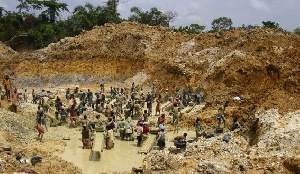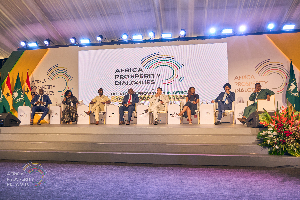Illegal small-scale mining (galamsey) will be decriminalised under a government of the Convention People’s Party (CPP), flagbearer Ivor Greenstreet has said.
Speaking at the Institute of Economic Affairs’ Evening Encounters with flagbearers ahead of this year’s polls, Mr Greenstreet said: “Small-scale mining is legal, but galamsey is illegal, so we have to do far more for the small-scale mining sector because after all, despite the unfortunate environmental degradation, the money stays in Ghana, but these large gold mining companies, 80 per cent of the money they take out stays abroad, so that is why we don’t see any benefits over the years we’ve been extracting that natural resource and now 30 per cent of total gold output is coming from local small-scale mining and galamsey, 30 per cent, and all of that money is remaining in Ghana, but it is creating this diabolical situation concerning water that we are faced with.
“So, in legalising galamsey, you don’t wake up one day and say: ‘I’m legalising galamsey’ because it requires serious attention to the kind of training they will be given, serious attention to changing the entirety of the way they go about their practices and all that will require cross-party support and require so many experts that will have to be part of that process because as of now the damage they are causing to our water bodies is horrific.”
Galamsey activities are rampant in all parts of the country where minerals are mined, especially in the Ashanti, Western and Eastern regions where some major international mining firms operate. They have always clashed with the mining firms, which complain of encroachment into their concessions. One such incident occurred in February between officials of AngloGold Ashanti and galamsey miners in Obuasi that led to the death of the company’s head of communications. He was run over by a company vehicle on February 6 during the skirmishes, as he tried escaping attacks from the irate stone-hurling galamseyers.
The deceased and other AngloGold Ashanti staff had gone to one of their concessions, which had been taken over by illegal miners, to ward off the galamseyers, but he got caught up in the middle of the ensuing violence that caused his death.
The incident caused AngloGold Ashanti Ghana to drag the government of Ghana to the International Centre for Settlement of Investment Disputes (ICSID).
The company said to protect and enforce its contractual rights in the face of increasing lawlessness, trespassing, and damage to property and threats to the safety of its employees, it had to invoke the dispute resolution provisions in its Mining Lease. Accordingly, AngloGold Ashanti filed a request for Arbitration with ICSID on Friday, 8 April 2016.
The case was registered on Monday, 2 May 2016. ICSID is an international arbitration institution, headquartered in Washington, D.C., which facilitates dispute resolution between international investors and host states.
The relevant authorities in Ghana, including the Attorney General, have been duly notified of the commencement of proceedings.
In early February 2016, following the incursion of the galamseyers inside the fenced area of the site, AngloGold Ashanti Ghana was forced to declare force majeure and, in the interests of safety, withdrew all employees performing non-essential functions from the Obuasi mine.
Remaining employees had been performing critical services related to the operation of underground water pumping, environmental and potable water treatment, provision of medical services, and maintenance of facilities that provide power and water to employees’ homes and surrounding communities.
There has been no impact on AngloGold Ashanti’s production and All-In Sustaining Costs as the site was not forecast to be in production for, at least, this year.
The incursion by illegal miners followed the withdrawal of military protection from the mine on Tuesday, 2 February 2016, after initial incursions on 30 and 31 January 2016.
The military had been stationed at the mine since 2013 on directions from the Ghanaian government in order to maintain law and order at the site. To this effect, a services agreement is in place between AngloGold Ashanti Ghana and the Ghana Army. Additionally, the Chamber of Mines, on behalf of its members, has entered into a Memorandum of Understanding with the Ghana Army, to support mine security and police through the deployment of military personnel at mining operations in the country.
Since February 2016, AngloGold Ashanti Ghana has engaged on numerous occasions with Ghana Cabinet ministers including the Minister of Lands and Natural Resources, the Minister of Defence, and other senior government officials over the security concerns.
AngloGold said despite these engagements, and the fact that Ghana’s President Mr John Mahama directed the return of security agencies in March, law and order was yet to be restored.
In its declaration of force majeure, AngloGold Ashanti Ghana explained that the current situation was precluding it from fulfilling certain conditions of its Amended Programme of Mining Operations, which was agreed with the government in November 2014.
In particular, the presence of illegal miners on the mine’s operational footprint, in its underground tunnels and in areas, which host key infrastructure at the mine, was impacting directly on AngloGold Ashanti Ghana’s ability to continue to perform even the most essential services referred to above, including the treatment of water for pollutants.
The miner said if allowed to continue unchecked, “this occupation of the lease area by illegal miners significantly undermines investor confidence and gravely threatens the long-term viability of the mine, as AngloGold Ashanti Ghana may be forced to withdraw all essential personnel currently on site, including personnel operating the mine’s underground water pumps, and suspend critical services to the mine and community.”
AngloGold Ashanti Ghana said it hopes that the commencement of ICSID proceedings will expedite the reinstatement of law and order at the mine.
Background
AngloGold Ashanti Ghana suspended underground mining operations at the Obuasi Mine at the end of 2014 after incurring heavy (and ultimately unaffordable) financial losses over several years.
Employees were paid a severance as mandated by law and in accordance with relevant Collective Agreements and Employment Contracts.
Despite a very difficult market for the global mining industry, AngloGold Ashanti Ghana continues to invest significant time, skill and financial resources in building the case for the Obuasi mine’s redevelopment into a much needed, long-term contributor to the local, regional and national economies. Since the suspension of operations, Obuasi has been in a government-approved limited operations phase, while AngloGold Ashanti Ghana conducts the feasibility study needed to determine whether the mine can be redeveloped into a profitable, productive operation that can once again be a significant employer and contributor to the local, regional and national economies in Ghana.
General News of Wednesday, 29 June 2016
Source: classfmonline.com

















